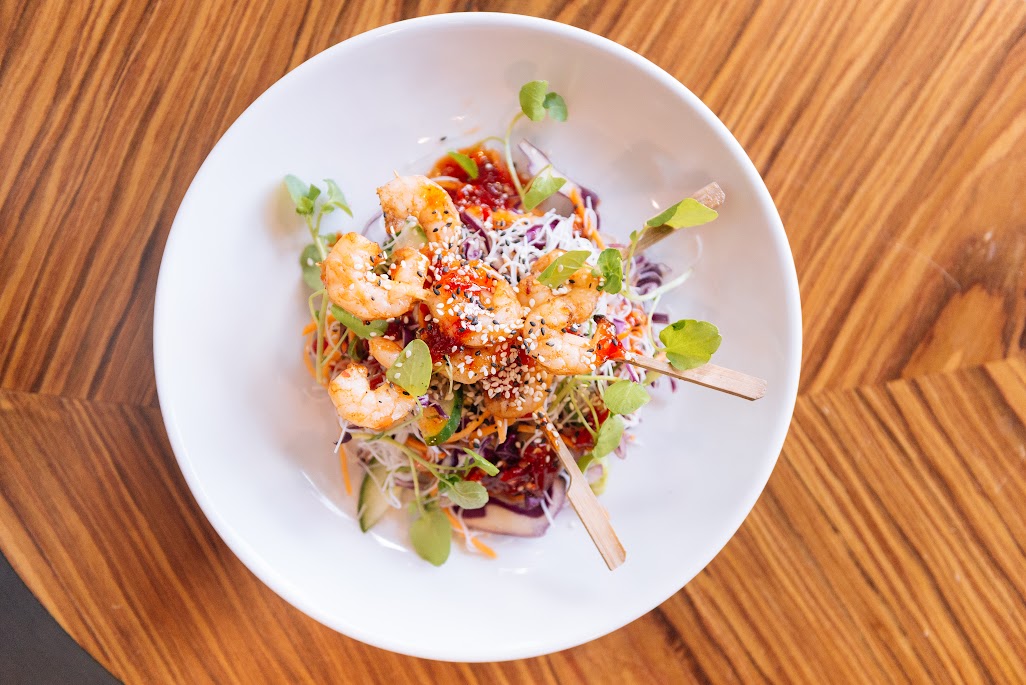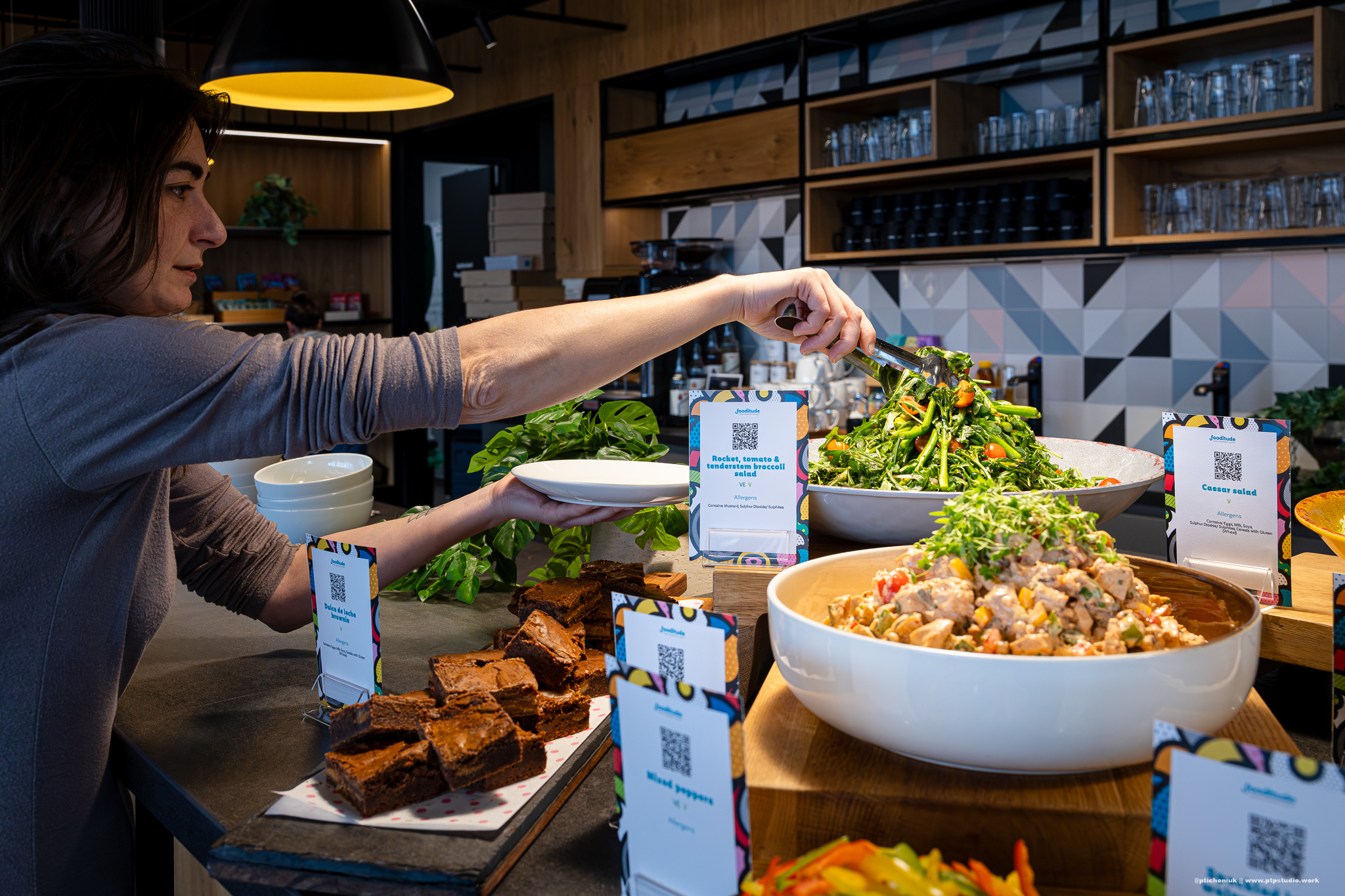The dynamics of the workplace have shifted dramatically. Gone are the days when employees would commute to the office without a second thought. The traditional office, once the epicentre of our working lives, has undergone a profound transformation.
The rise of remote work and the subsequent adoption of hybrid work models have fundamentally altered the way we view the traditional office. Employees now have a choice, and the office must compete for their presence.
Business leaders, you’re at a major turning point. Juggling hybrid work models, whilst keeping employees engaged is no small feat.
Reconnecting in a Disconnected World
So, execs, here’s the big question: How can you ignite a sense of connection that takes office life to a whole new level?
The question isn’t yours alone, many businesses are grappling with how to bring everyone together and realign their workplace cultures.
Every kind of office environment, from tech startups to the big-league corporations, is seeing this disconnection – with many managers wondering how they can navigate through the uncertainty and keep their employees happy and engaged.
Let’s dive into:
- The real deal about the costs of overlooking company culture.
- Why food isn’t just a nice-to-have but a must-have strategic tool.
The Tangible Impact of Intangible Losses
Senior Leadership's Perspective
Business leaders can more often than not see things like office catering as extras, not essentials. But here’s the thing – that view is missing the mark.
A Forbes article on employee well-being really drives this home, “Many CEOs see employee well-being as a second tier priority, or merely a nice thing to do,” writes Jim Purcell.
Investing in your team pays off in ways that are difficult to quantify. Neglecting your culture can hit you where it hurts – recruitment costs, engagement levels, even sick days all start to add up.
According to Purcell, a former CEO himself, “Employee well-being enables core business objectives. Abundant data by Gallup, Deloitte and the Centers for Disease Control show that high employee well-being boosts engagement, lowers turnover and absenteeism, improves customer service and product quality, and leads to higher profits, lower healthcare costs and even higher shareholder value.”
Breaking Down the Unseen Costs
Decreased Productivity:
Missed breaks and chances to bond, like over lunch, can lead to decreased productivity in the long term. Investing in employee meal times isn’t just about food, it’s about smarter work.
Harvard Business Review tells us these aren’t just breaks; they’re golden opportunities for a productivity boost:
“Companies would do well to think carefully about investing in and facilitating where, when, and how employees eat at work. Although many large employers provide on-site cafeterias (often serviced by outside catering companies), others, such as Google, famously go much further, offering free, high-quality, abundantly varied meals. By using free food to entice employees to stay on campus, such companies not only increase productivity (because workers aren’t spending time in transit); they also increase the odds that coworkers will eat with one another.”
Source – Harvard Business Review
Cultural Gaps:
In today’s diverse work environment, a lack of unity can lead to more than just a shortage of connection; it can result in serious inefficiencies and miscommunications. These gaps can undermine the overall workplace environment, leading to a disjointed and less cohesive team dynamic.
A strong, united culture, fostered by shared experiences such as meals, can act as a bridge, promoting understanding and smoothing over potential divisions.
Employee dissatisfaction/disengagement
Employee engagement is critical. When employees don’t feel connected or valued, their commitment wanes, leading to a lack of enthusiasm and mental check-out.
Heard of the term ‘Quiet Quitting’? In GALLUP’s State of the Global Workplace: 2023 Report, “59% of employees are not engaged and are just filling a seat.” According to the report, this group is more likely feeling lost and disconnected from their workplace.
But that’s not all. Disengagement also costs companies and the economy money. GALLUP’s report also notes that, “Low engagement costs the global economy an estimated US$8.8 trillion and accounts for 9% of global GDP.”
These stats underscore why improving engagement is crucial for both employees and organisations. Cultivating a culture that values employee satisfaction can drastically improve retention, participation and overall workplace productivity.
Higher Employee Turnover/Poor Talent Acquisition
The struggle to retain and attract top talent in today’s competitive job market can be directly linked to a company’s culture. A vibrant, engaging office environment, highlighted by perks like quality office catering, can set a company apart.
Harvard Business Review backs this up: “According to one survey, North American employees who regularly take lunch breaks report higher levels of engagement, as evidenced by improved job satisfaction, productivity, and a greater likelihood of recommending their workplace to others.”
Source: Harvard Business Review
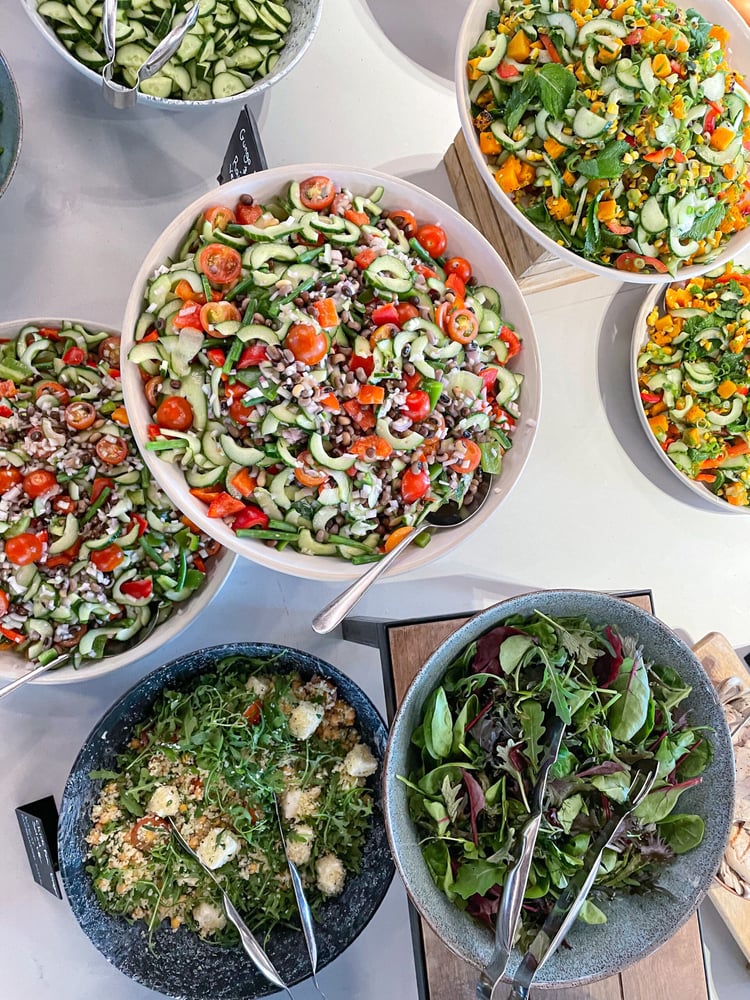
Food as a Strategic Investment, Not a Costly Expense
Recognising the Value of Food in the Workplace
So, did the title catch your attention? Our recent survey ‘The Role of Food in the Workplace’ provides an eye-opening perspective on office catering. Remarkably, two-thirds of workplaces without free food services cite two main reasons for its absence:
- Senior management’s lack of understanding
- Budgetary constraints
There’s a gap here we cannot ignore.
Why doesn’t your workplace offer free food?
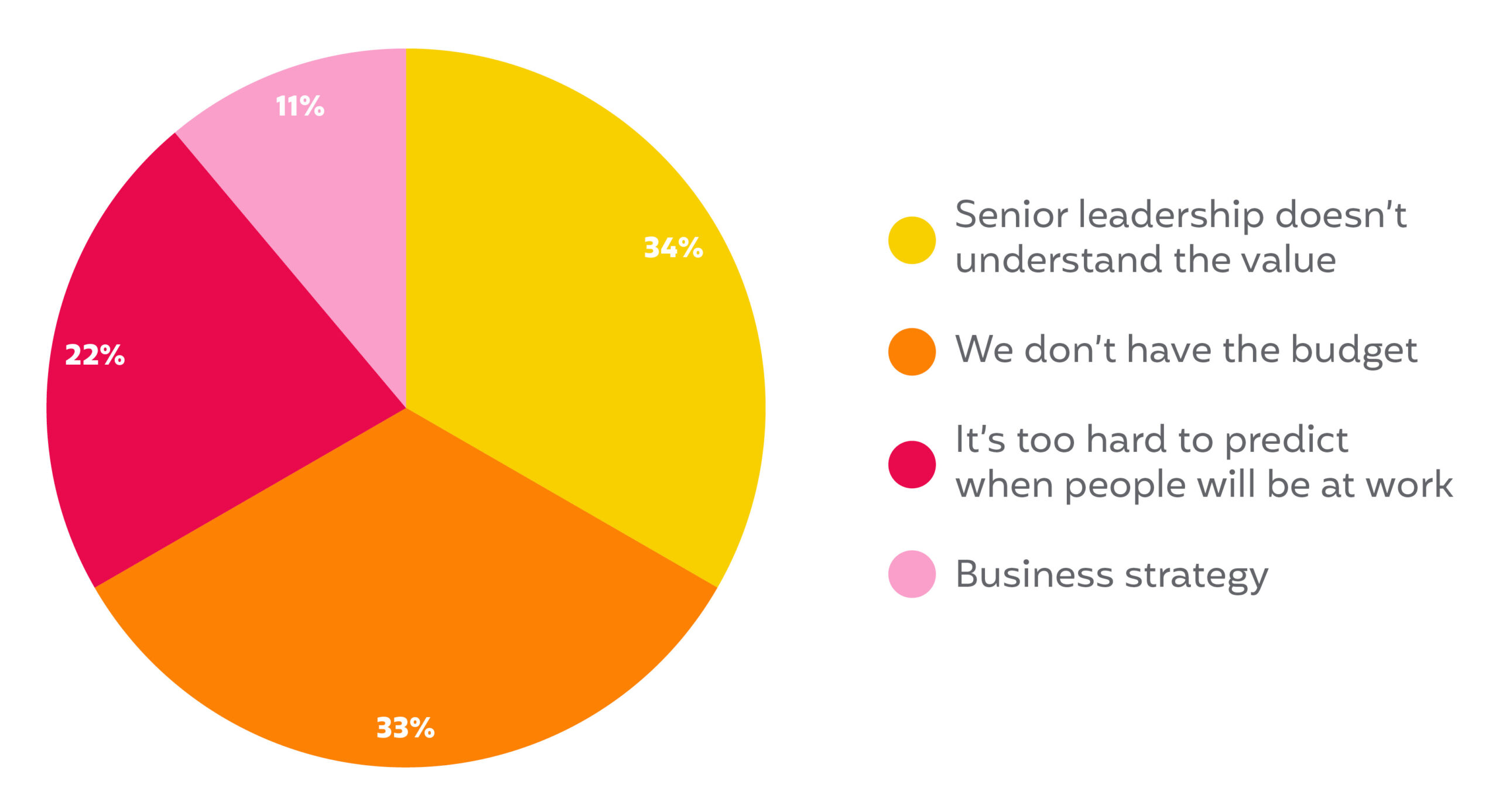
Rather than viewing office catering as a mere expense, it’s essential to see it as an investment in employee satisfaction, collaboration, and overall company culture. By overlooking the benefits, businesses risk missing out on a powerful tool that can significantly enhance the workplace environment.
The ROI of Employee Well-being
Our survey shows that a whopping 84% of respondents believe shared meals boost collaboration, and 80% think it ups productivity and cuts down on loneliness.
That’s more than numbers; it’s about how eating together can really be the glue in your workplace culture. This data illustrates that shared dining experiences are more than just a perk; they’re integral to building a thriving workplace culture, where meals serve as a platform for connection and creating a sense of belonging.
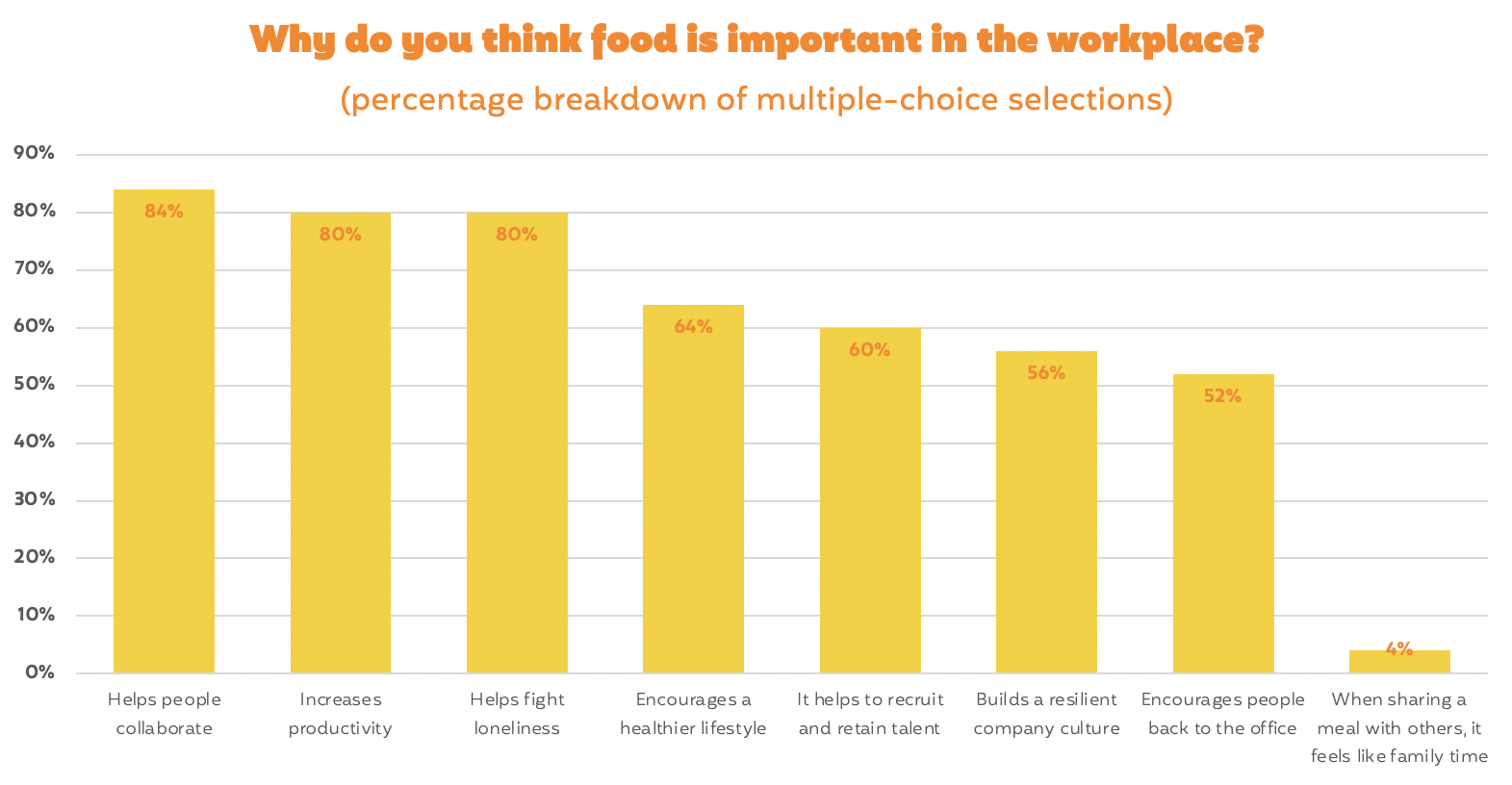
Aligning Catering with Company Objectives
Incorporating a well-thought-out catering strategy aligns with broader company objectives such as enhancing employee engagement, attracting and retaining talent, and building a resilient and adaptive organisational culture.
For instance, offering a variety of appealing food options is a sure sign of a company’s commitment to employee health and well-being, an increasingly important factor in today’s workforce.
Addressing the Commercial Aspect
Choosing a delivered-in catering service like Fooditude’s means getting more bang for your buck. Traditional on-site catering requires significant overheads, including kitchen space, equipment, and staff. On the other hand, delivered-in catering offers a more flexible and scalable solution. Here’s an example:
We have a client in Soho with 500 staff. To cater for them on-site would require at least 3000 sq ft of kitchen space. The cost of premium office space in Soho starts at around £80/sq ft. We help them save a whopping £240,000/year in rent, not to mention upwards of £500,000 on the cost of equipping the kitchen in the first place.
Even if you do have office space that was once a big on-site kitchen, you can easily repurpose the sq ft to create a cool place for employees to enjoy (pool tables, gaming areas, sleep pods etc) or even extend desk space.
Apart from saving on rent and space, delivered-in catering is also a more adaptable service, meaning that companies can customise their food programmes based on specific needs and fluctuating staff numbers, especially relevant in the era of hybrid working models.
Introducing Fooditude as the Game Changer: The Off-Site Kitchen, Delivered-in Catering Model
Here at Fooditude, we’re all about creating a thriving workplace culture, and we know good food is a big part of that. Our unique 20 000 sq’ off-site kitchen and delivered-in catering model are designed not just to feed, but to foster connection and collaboration. We think of it as bringing something special to the table to help businesses build an engaging office environment.
The Flexibility and Efficiency of Off-Site Kitchens
Our off-site kitchen model meets the needs of today’s workspaces. We whip up a variety of cooked-from-scratch, fresh meals for offices around central London on the daily. This approach allows for the preparation of a wide variety of high-quality, locally sourced dishes without the need for extensive kitchen facilities at the office.
Delivered catering provides unparalleled 360 degree flexibility, making it easy to scale up or down based on the company’s needs and headcount, which is particularly beneficial in the hybrid work model that many companies offer.
Adapting to the Modern Workplace
Efficiency and adaptability are key in today’s office world. Fooditude’s model caters to most office sizes and we like to have fun doing it. No matter if you’re a startup or a big corporation, we’ve got you covered. This versatility ensures that your catering needs are met with the same level of quality and attention to detail.
Quality without Compromise is a Non-Negoatiable
We are completely committed to quality. Despite the logistical challenges that off-site catering might pose, we have mastered the art of delivering meals that are both delicious and nutritious. Wondering how it all works? Check out A Day in the Life of Fooditude.
Our menu selections are thoughtfully crafted to offer a variety of options, catering to diverse tastes and dietary requirements, ensuring that every employee feels included and valued.
Service with a Difference: We’re Your Partner in Cultivating Workplace Culture
Fooditude is more than just a catering service; we’re your partners in building a positive workplace culture. By taking care of the food aspect with our operational teams and catering managers, we allow companies to focus on their core business activities, while also contributing to a more engaging and collaborative work environment.
Sustainability is at Our Core
Sustainability isn’t just a buzzword for us at Fooditude; it’s a core principle. Our approach goes beyond just serving food; it’s about doing so in a way that respects and preserves the environment.
This commitment to sustainability is reflected in our choice of locally sourced and seasonal ingredients, how we reduce food waste, and our goal to be net zero by 2040.

Making the Case to Senior Management
We know getting senior management on board with a new catering service can feel like a tough sell. But here’s the trick: show them how it’s not just about great food, it’s about hitting those big-picture goals – company growth, profitability, innovation, staving off retrenchments, and keeping the talented employees who’ll help you get to the next level.
And let’s talk numbers too:
- Make a case for using services like delivered-in catering, which means minimal overhead costs and operational expenses, and flexible food programmes that can fit to the company’s budget and fluctuating headcount e.g., just because you have 100 employees, doesn’t mean you need to cater for 100 people each day, if only 50 are coming in.
- Highlight the long-term financial perks – like how a buzzing office culture can mean less staff turnover and associated hiring costs with finding new talent. Trust our success collaborating with London’s most innovative companies, it’s a pitch worth making!
The Future of Office Catering: A Call to Leaders
Finally, let’s chat about the bright future of office catering! It’s no longer just about filling bellies; it’s becoming a key player in reshaping company cultures and showing employees they’re truly valued. Think of it as your secret weapon for boosting morale and commitment.
So, leaders, it’s time to get on board! Embracing this evolution in office catering isn’t just forward-thinking; it’s smart business.
By recognising the power of great food, you’re setting up your teams not just to succeed but to genuinely enjoy their work and, in turn, drive your company to new heights. Let’s make the office a place where everyone’s excited to be.
Ready to elevate your company’s culture through catering? Get in touch with us and explore how you can create a flexible, fun food programme that enhances your office culture, one meal at a time.


